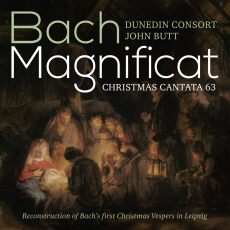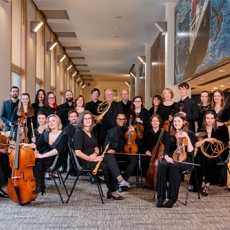Dunedin Consort - J.S. Bach: Magnificat - McAlister Matheson Music
The Dunedin Consort’s latest recording makes for a vivid and joyous musical celebration of Christmas. It presents JS Bach’s Magnificat in E flat and Cantata No. 63 within a reconstruction of Vespers in the Nikolaikirche on 25 December 1723 – Bach’s first Christmas in Leipzig.
The reconstruction comes complete with organ preludes and congregational chorales – only two of the latter, but their effect is striking, with fine unison and harmony singing from the fifty or so singers who participated. (A third prelude and chorale are available as a free download from Linn.)
It was fascinating to hear continuo organist Stephen Farr not only play the preludes to the chorales (on the Greyfriars Kirk organ) but also improvise organ accompaniments in the style of the period, to the extent of flourishes between each line of one chorale verse.
Opening the proceedings, eight singers give an elegant performance of Giovanni Gabrieli’s double-choir motet Hodie Christus natus est. The same forces are involved in a gloriously jubilant rendering of the cantata Christen, ätzet diesen Tag, joined by a substantial instrumental ensemble including four trumpets, the only instance of Bach’s using that number. Its recitatives are striking (Clare Wilkinson especially compelling in the first of the three), and the two duets sublime – listen to the effect of the solo oboe intertwining with Joanne Lunn’s soprano and Matthew Brook’s bass in their aria. With two of Bach’s most joyful choruses opening and closing the work, it encapsulates the reflective and exuberant aspects of Christmas Day.
John Butt himself plays Bach’s majestic Fugue on the Magnificat BWV733, a perfect introduction to the Magnificat in E flat that follows. This choral work had most likely been written six months previously, and ten years later Bach produced a new version transposed down a semitone to D major – now the better-known version. However, the earlier work is different in other respects, such as instrumentation and the disposition of string parts, and in addition John Butt has chosen (for reasons given in his excellent booklet essay) to perform the work at an orchestral pitch of A=392 – a semitone lower than one might expect.
This performance of the Magnificat incorporates four Laudes (settings of seasonal German and Latin hymns) that seem to have been a Leipzig custom. They add yet more variety to the music on offer. Throughout, bustling orchestral passages and forthright choral singing contrast with passages of exquisite serenity (try track 26, Suscepit Israel), and there is exemplary attention to the text by the singers.
Look no further for this year’s essential Christmas disc!


